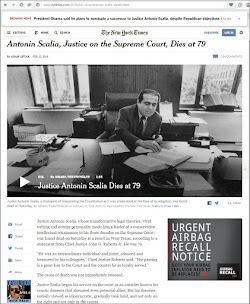 US Supreme Court Justice Antonin Scalia Dies
US Supreme Court Justice Antonin Scalia Dies
by Daryl Parsons
(Feb. 13, 2016 20:00 ET) United States Supreme Court Justice Antonin Scalia’s death in Texas today comes at a time when the Citizens United case, of which Scalia was part of the majority opinion, allowed corporate money to infiltrate the political process.
This has been an issue of much debate during the 2016 presidential race where campaign finance reform has been at the forefront of issues discussed.
In Citizens United v. Federal Election Commission, No. 08-205, 558 U.S. 310 (2010), the opinion of the court was split 5-4, with Justice Scalia making up part of the five justices ruling in favor of the case.
Of the nine total Justices, the breakdown included Justices Kennedy, Roberts, Alito, Thomas, and Scalia for the majority opinion. Dissenting opinions were held by Justices Stevens, Ginsburg, Breyer, and Justice Sotomayor.
Scalia’s replacement is expected to set off political resistance over the course of the next year within which time an appointment may fill the slot.
Case Summary
Facts of the case
Citizens United sought an injunction against the Federal Election Commission in the United States District Court for the District of Columbia to prevent the application of the Bipartisan Campaign Reform Act (BCRA) to its film Hillary: The Movie. The Movie expressed opinions about whether Senator Hillary Rodham Clinton would make a good president.
In an attempt to regulate “big money” campaign contributions, the BCRA applies a variety of restrictions to “electioneering communications.” Section 203 of the BCRA prevents corporations or labor unions from funding such communication from their general treasuries. Sections 201 and 311 require the disclosure of donors to such communication and a disclaimer when the communication is not authorized by the candidate it intends to support.
Citizens United argued that: 1) Section 203 violates the First Amendment on its face and when applied to The Movie and its related advertisements, and that 2) Sections 201 and 203 are also unconstitutional as applied to the circumstances.
The United States District Court denied the injunction. Section 203 on its face was not unconstitutional because the Supreme Court in McConnell v. FEC had already reached that determination. The District Court also held that The Movie was the functional equivalent of express advocacy, as it attempted to inform voters that Senator Clinton was unfit for office, and thus Section 203 was not unconstitutionally applied. Lastly, it held that Sections 201 and 203 were not unconstitutional as applied to the The Movie or its advertisements. The court reasoned that the McConnell decision recognized that disclosure of donors “might be unconstitutional if it imposed an unconstitutional burden on the freedom to associate in support of a particular cause,” but those circumstances did not exist in Citizen United’s claim.
Source: oyez.org (Accessed Feb. 13, 2016 20:00 EST)
Related News Stories:
Justice Antonin Scalia dead at 79 (Feb. 13, 2016 19:37 EST), Washington Post
 Antonin Scalia Justice on the Supreme Court Dies at 79, (Feb. 13, 2016 19:00 EST), New York Times
Antonin Scalia Justice on the Supreme Court Dies at 79, (Feb. 13, 2016 19:00 EST), New York Times
Reference:
